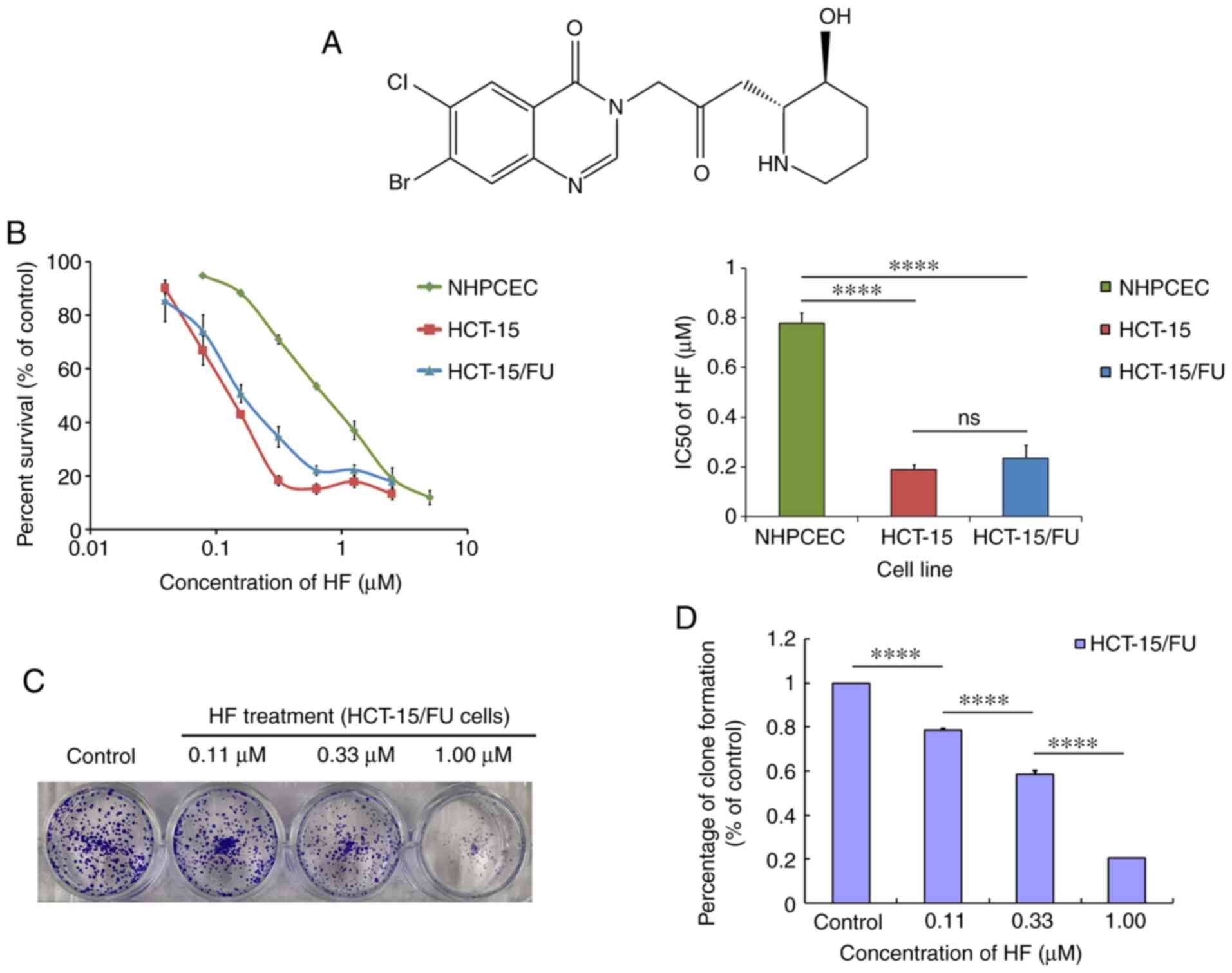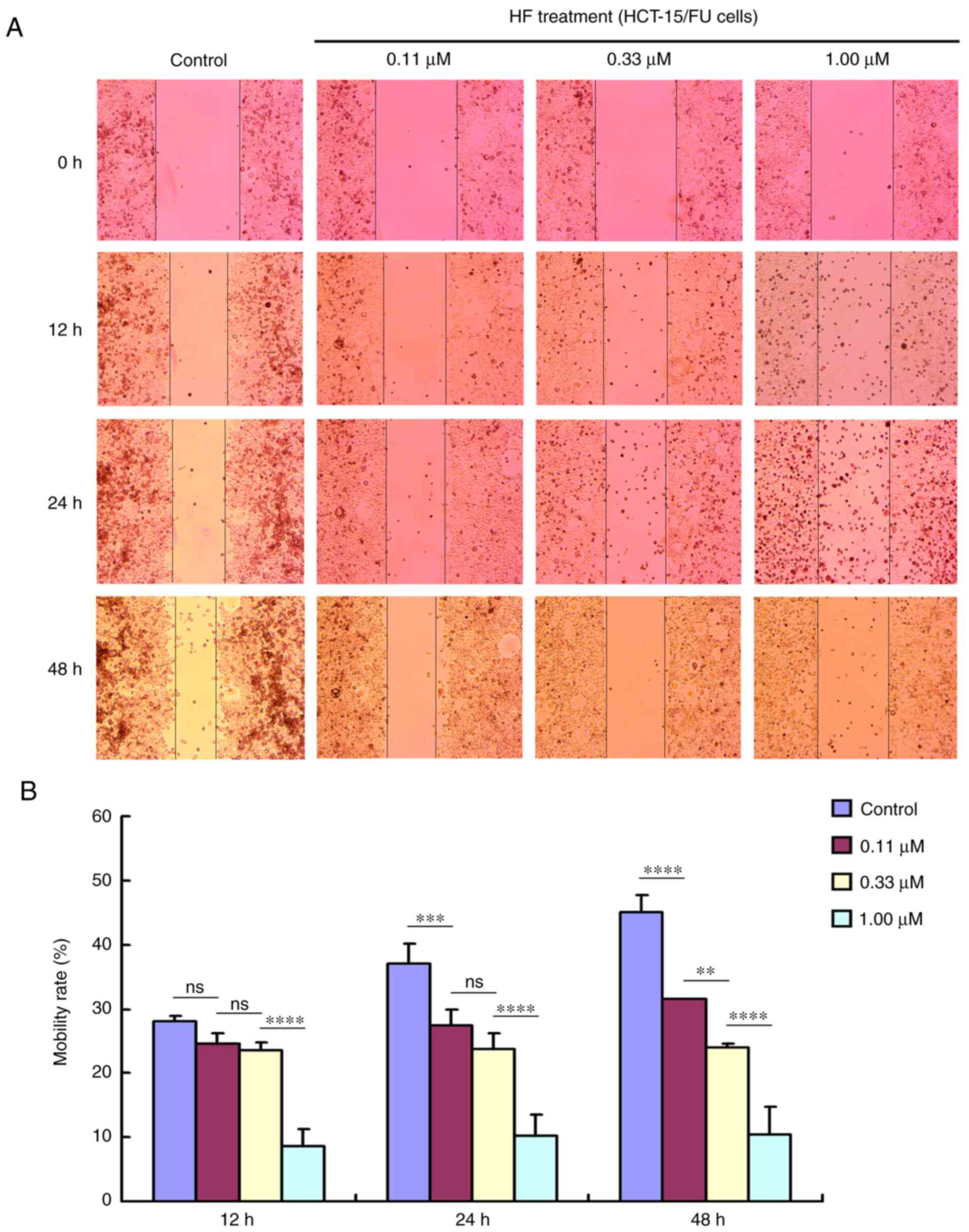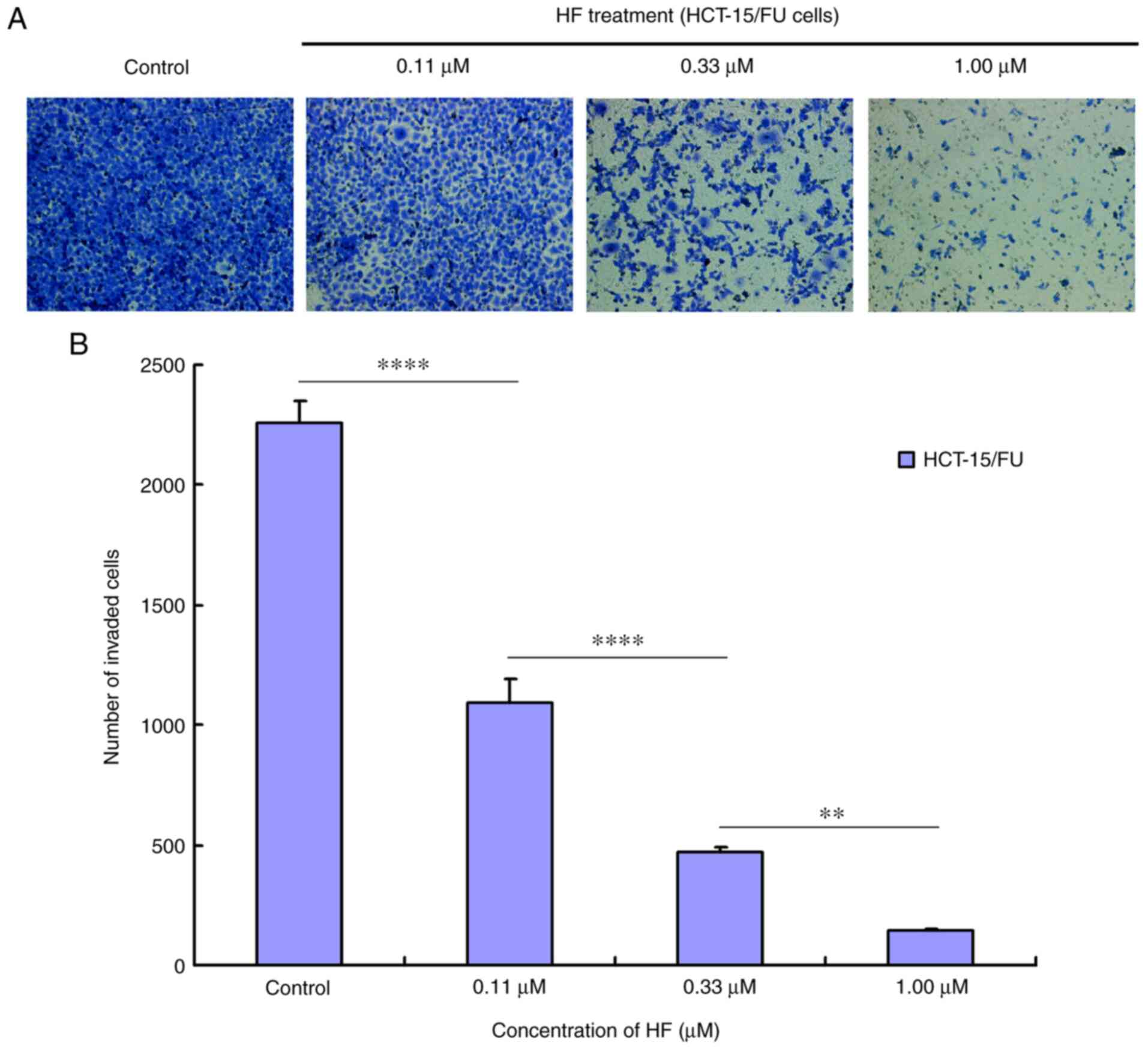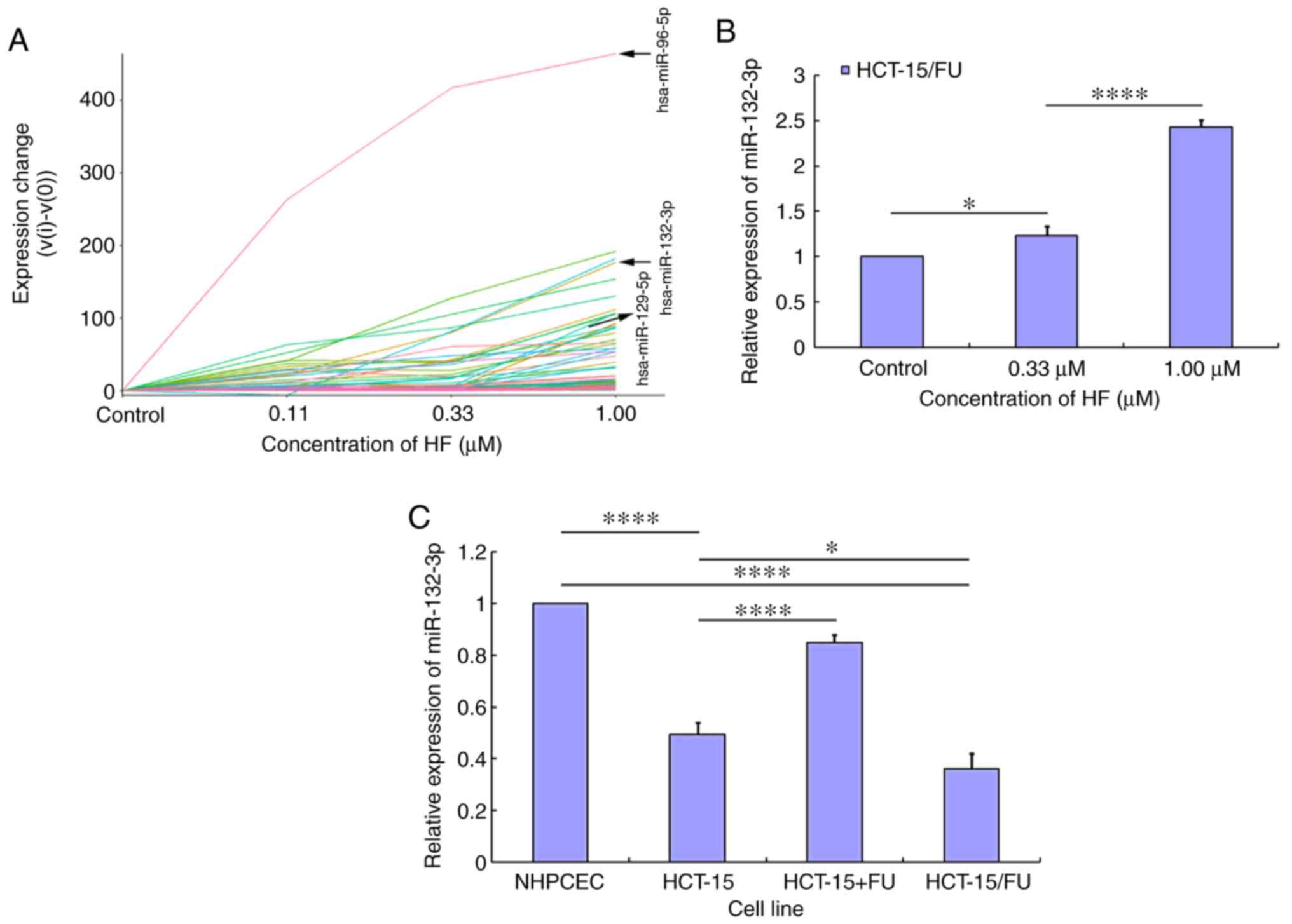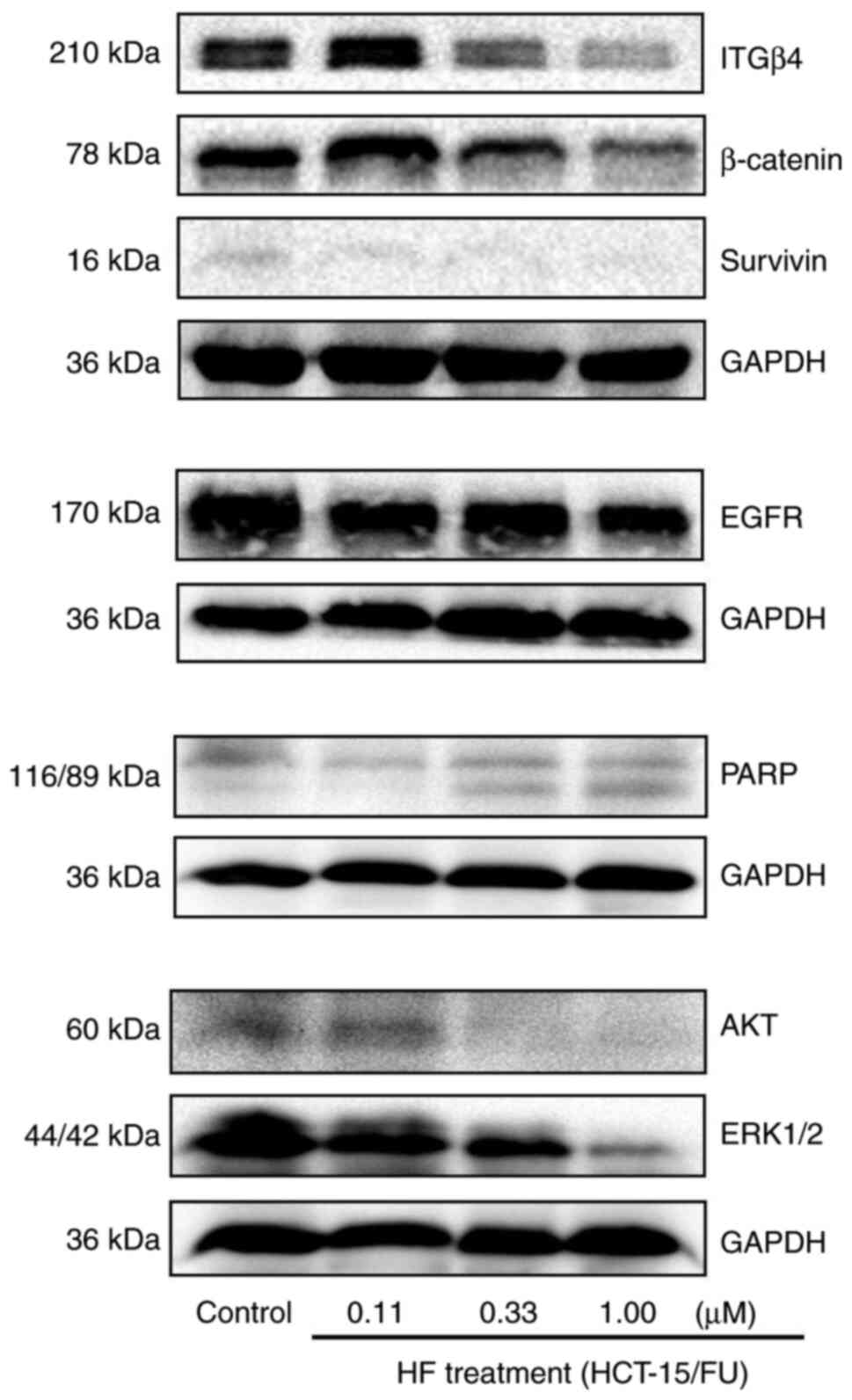|
1
|
Bray F, Ferlay J, Soerjomataram I, Siegel
RL, Torre LA and Jemal A: Global cancer statistics 2018: GLOBOCAN
estimates of incidence and mortality worldwide for 36 cancers in
185 countries. CA Cancer J Clin. 68:394–424. 2018. View Article : Google Scholar : PubMed/NCBI
|
|
2
|
Chiba H, Takahashi A, Inamori M, Goto T,
Ohata K, Matsuhashi N and Nakajima A: Early colon cancer presenting
as intussusception and successfully treated using endoscopic
submucosal dissection. Endoscopy. 46:E326–E327. 2014. View Article : Google Scholar : PubMed/NCBI
|
|
3
|
Kiriyama S, Saito Y, Yamamoto S, Soetikno
R, Matsuda T, Nakajima T and Kuwano H: Comparison of endoscopic
submucosal dissection with laparoscopic-assisted colorectal surgery
for early-stage colorectal cancer: A retrospective analysis.
Endoscopy. 44:102410–102430. 2012.
|
|
4
|
Kudo S: Endoscopic mucosal resection of
flat and depressed types of early colorectal cancer. Endoscopy.
25:455–461. 1993. View Article : Google Scholar : PubMed/NCBI
|
|
5
|
Yang D, Othman M and Draganov PV:
Endoscopic mucosal resection vs endoscopic submucosal dissection
for barrett's esophagus and colorectal neoplasia. Clin
Gastroenterol Hepatol. 17:1019–1028. 2019. View Article : Google Scholar : PubMed/NCBI
|
|
6
|
Dumoulin FL and Hildenbrand R: Endoscopic
resection techniques for colorectal neoplasia: Current
developments. World J Gastroenterol. 25:300–307. 2019. View Article : Google Scholar : PubMed/NCBI
|
|
7
|
Fakih MG: Metastatic colorectal cancer:
Current state and future directions. J Clin Oncol. 33:1809–1824.
2015. View Article : Google Scholar : PubMed/NCBI
|
|
8
|
Jiang S, Zeng Q, Gettayacamin M, Tungtaeng
A, Wannaying S, Lim A, Hansukjariya P, Okunji CO, Zhu S and Fang D:
Antimalarial activities and therapeutic properties of febrifugine
analogs. Antimicrob Agents Chemother. 49:1169–1176. 2005.
View Article : Google Scholar : PubMed/NCBI
|
|
9
|
Pines M, Snyder D, Yarkoni S and Nagler A:
Halofuginone to treat fibrosis in chronic graft-versus-host disease
and scleroderma. Biol Blood Marrow Transplant. 9:417–425. 2003.
View Article : Google Scholar : PubMed/NCBI
|
|
10
|
Pines M and Nagler A: Halofuginone: A
novel antifibrotic therapy. Gen Pharmacol. 30:445–450. 1998.
View Article : Google Scholar : PubMed/NCBI
|
|
11
|
Xia X, Wang L, Zhang X, Wang S, Lei L,
Cheng L, Xu Y, Sun Y, Hang B, Zhang G, et al: Halofuginone-induced
autophagy suppresses the migration and invasion of MCF-7 cells via
regulation of STMN1 and p53. J Cell Biochem. 119:4009–4020. 2018.
View Article : Google Scholar : PubMed/NCBI
|
|
12
|
Nagler A, Ohana M, Shibolet O, Shapira MY,
Alper R, Vlodavsky I, Pines M and Ilan Y: Suppression of
hepatocellular carcinoma growth in mice by the alkaloid
coccidiostat halofuginone. Eur J Cancer. 40:1397–1403. 2004.
View Article : Google Scholar : PubMed/NCBI
|
|
13
|
Juárez P, Mohammad KS, Yin JJ, Fournier
PG, McKenna RC, Davis HW, Peng XH, Niewolna M, Javelaud D, Chirgwin
JM, et al: Halofuginone inhibits the establishment and progression
of melanoma bone metastases. Cancer Res. 72:6247–6256. 2012.
View Article : Google Scholar : PubMed/NCBI
|
|
14
|
Leiba M, Jakubikova J, Klippel S,
Mitsiades CS, Hideshima T, Tai YT, Leiba A, Pines M, Richardson PG,
Nagler A and Anderson KC: Halofuginone inhibits multiple myeloma
growth in vitro and in vivo and enhances cytotoxicity of
conventional and novel agents. Br J Haematol. 157:718–731. 2012.
View Article : Google Scholar : PubMed/NCBI
|
|
15
|
de Jonge MJ, Dumez H, Verweij J, Yarkoni
S, Snyder D, Lacombe D, Marréaud S, Yamaguchi T, Punt CJ and van
Oosterom A; EORTC New Drug Development Group (NDDG), : Phase I and
pharmacokinetic study of halofuginone, an oral quinazolinone
derivative in patients with advanced solid tumours. Eur J Cancer.
42:1768–1774. 2006. View Article : Google Scholar : PubMed/NCBI
|
|
16
|
Yan YY, Bi H, Zhang W, Wen Q, Liu H, Li
JX, Zhang HZ, Zhang YX and Li JS: Downregulation and subcellular
distribution of HER2 involved in MDA-MB-453 breast cancer cell
apoptosis induced by lapatinib/celastrol combination. J BUON.
22:644–651. 2017.PubMed/NCBI
|
|
17
|
Wei M, Li J, Qiu J, Yan Y, Wang H, Wu Z,
Liu Y, Shen X, Su C, Guo Q, et al: Costunolide induces apoptosis
and inhibits migration and invasion in H1299 lung cancer cells.
Oncol Rep. 43:1986–1994. 2020.PubMed/NCBI
|
|
18
|
Livak KJ and Schmittgen TD: Analysis of
relative gene expression data using real-time quantitative PCR and
the 2(-Delta Delta C(T)) method. Methods. 25:402–408. 2001.
View Article : Google Scholar : PubMed/NCBI
|
|
19
|
Assis PA, De Figueiredo-Pontes LL, Lima
AS, Leão V, Cândido L, Pintão CT, Garcia AB, Saggioro FP, Panepucci
RA, Chahud F, et al: halofuginone inhibits phosphorylation of
SMAD-2 reducing angiogenesis and leukemia burden in an acute
promyelocytic leukemia mouse model. J Exp Clin Cancer Res.
34:652015. View Article : Google Scholar : PubMed/NCBI
|
|
20
|
de Figueiredo-Pontes LL, Assis PA,
Santana-Lemos BA, Jácomo RH, Lima AS, Garcia AB, Thomé CH, Araújo
AG, Panepucci RA, Zago MA, et al: Halofuginone has
anti-proliferative effects in acute promyelocytic leukemia by
modulating the transforming growth factor beta signaling pathway.
PLoS One. 6:e267132011. View Article : Google Scholar : PubMed/NCBI
|
|
21
|
Babaei K, Shams S, Keymoradzadeh A, Vahidi
S, Hamami P, Khaksar R, Norollahi SE and Samadani AA: An insight of
microRNAs performance in carcinogenesis and tumorigenesis; an
overview of cancer therapy. Life Sci. 240:1170772020. View Article : Google Scholar : PubMed/NCBI
|
|
22
|
An X, Sarmiento C, Tan T and Zhu H:
Regulation of multidrug resistance by microRNAs in anti-cancer
therapy. Acta Pharm Sin B. 7:38–51. 2017. View Article : Google Scholar : PubMed/NCBI
|
|
23
|
Denli AM, Tops BB, Plasterk RH, Ketting RF
and Hannon GJ: Processing of Primary microRNAs by the
microprocessor Complex. Nature. 432:231–235. 2004. View Article : Google Scholar : PubMed/NCBI
|
|
24
|
Bartel DP: MicroRNAs: Genomics,
biogenesis, mechanism, and function. Cell. 116:281–297. 2004.
View Article : Google Scholar : PubMed/NCBI
|
|
25
|
Zhang J, Li D, Zhang Y, Ding Z, Zheng Y,
Chen S and Wan Y: Integrative analysis of mRNA and miRNA expression
profiles reveals seven potential diagnostic biomarkers for nonsmall
cell lung cancer. Oncol Rep. 43:99–112. 2020.PubMed/NCBI
|
|
26
|
Jung G, Hernández-Illán E, Moreira L,
Balaguer F and Goel A: Epigenetics of colorectal cancer: Biomarker
and therapeutic potential. Nat Rev Gastroenterol Hepatol.
17:111–130. 2020. View Article : Google Scholar : PubMed/NCBI
|
|
27
|
Zheng Y, Zheng Y, Lei W, Xiang L and Chen
M: miR-1307-3p overexpression inhibits cell proliferation and
promotes cell apoptosis by targeting ISM1 in colon cancer. Mol Cell
Probes. 48:1014452019. View Article : Google Scholar : PubMed/NCBI
|
|
28
|
Bandres E, Agirre X, Bitarte N, Ramirez N,
Zarate R, Roman-Gomez J, Prosper F and Garcia-Foncillas J:
Epigenetic regulation of microRNA expression in colorectal cancer.
Int J Cancer. 125:2737–2743. 2009. View Article : Google Scholar : PubMed/NCBI
|
|
29
|
Chen L, Zhu Q, Lu L and Liu Y: MiR-132
inhibits migration and invasion and increases chemosensitivity of
cisplatin-resistant oral squamous cell carcinoma cells via
targeting TGF-β1. Bioengineered. 11:91–102. 2020. View Article : Google Scholar : PubMed/NCBI
|
|
30
|
Li SL, Sui Y, Sun J, Jiang TQ and Dong G:
Identification of tumor suppressive role of microRNA-132 and its
target gene in tumorigenesis of prostate cancer. Int J Mol Med.
41:2429–2433. 2018.PubMed/NCBI
|
|
31
|
Chen X, Li M, Zhou H and Zhang L: miR-132
targets FOXA1 and exerts tumor-suppressing functions in thyroid
cancer. Oncol Res. 27:431–437. 2019. View Article : Google Scholar : PubMed/NCBI
|
|
32
|
Khan S, Ebeling MC, Chauhan N, Thompson
PA, Gara RK, Ganju A, Yallapu MM, Behrman SW, Zhao H, Zafar N, et
al: Ormeloxifene suppresses desmoplasia and enhances sensitivity of
gemcitabine in pancreatic cancer. Cancer Res. 75:2292–2304. 2015.
View Article : Google Scholar : PubMed/NCBI
|
|
33
|
Chen Y, Zhu H, Wang Y, Song Y, Zhang P,
Wang Z, Gao J, Li Z and Du Y: MicroRNA-132 plays an independent
prognostic role in pancreatic ductal adenocarcinoma and acts as a
tumor suppressor. Technol Cancer Res Treat.
18:15330338188243142019. View Article : Google Scholar : PubMed/NCBI
|
|
34
|
Zhao JL, Zhang L, Guo X, Wang JH, Zhou W,
Liu M, Li X and Tang H: miR-212/132 downregulates SMAD2 expression
to suppress the G1/S phase transition of the cell cycle and the
epithelial to mesenchymal transition in cervical cancer cells.
IUBMB life. 67:380–394. 2015. View
Article : Google Scholar : PubMed/NCBI
|
|
35
|
Yu Y, Lu W, Zhou X, Huang H, Shen S and
Guo L: MicroRNA-132 suppresses migration and invasion of renal
carcinoma cells. J Clin Lab Anal. 34:e229692020. View Article : Google Scholar : PubMed/NCBI
|
|
36
|
Liu Y and Zhang M: miR-132 Regulates
adriamycin resistance in colorectal cancer cells through targeting
extracellular signal-regulated kinase 1. Cancer Biother Radiopharm.
34:398–404. 2019. View Article : Google Scholar : PubMed/NCBI
|
|
37
|
Zhang XL, Sun BL, Tian SX, Li L, Zhao YC
and Shi PP: MicroRNA-132 reverses cisplatin resistance and
metastasis in ovarian cancer by the targeted regulation on Bmi-1.
Eur Rev Med Pharmacol Sci. 23:3635–3644. 2019.PubMed/NCBI
|
|
38
|
Li YL, Zhao YG, Chen B and Li XF:
MicroRNA-132 sensitizes nasopharyngeal carcinoma cells to cisplatin
through regulation of forkhead box A1 protein. Pharmazie.
71:715–718. 2016.PubMed/NCBI
|
|
39
|
Liu GF, Zhang SH, Li XF, Cao LY, Fu ZZ and
Yu SN: Overexpression of microRNA-132 enhances the radiosensitivity
of cervical cancer cells by down-regulating Bmi-1. Oncotarget.
8:80757–80769. 2017. View Article : Google Scholar : PubMed/NCBI
|
|
40
|
Saini S, Arora S, Majid S, Shahryari V,
Chen Y, Deng G, Yamamura S, Ueno K and Dahiya R: Curcumin modulates
microRNA-203-mediated regulation of the Src-Akt axis in bladder
cancer. Cancer Prev Res (Phila). 4:1698–1709. 2011. View Article : Google Scholar : PubMed/NCBI
|
|
41
|
Zhang H, Liu X, Chen S, Wu J, Ye X, Xu L,
Chen H, Zhang D, Tan R and Wang Y: Tectorigenin inhibits the in
vitro proliferation and enhances miR-338* expression of pulmonary
fibroblasts in rats with idiopathic pulmonary fibrosis. J
Ethnopharmacol. 131:165–173. 2010. View Article : Google Scholar : PubMed/NCBI
|
|
42
|
Fu R, Yang P, Sajid A and Li Z:
Avenanthramide A induces cellular senescence via
miR-129-3p/Pirh2/p53 signaling pathway to suppress colon cancer
growth. J Agric Food Chem. 67:4808–4816. 2019. View Article : Google Scholar : PubMed/NCBI
|
|
43
|
Xia X, Wang X, Zhang S, Zheng Y, Wang L,
Xu Y, Hang B, Sun Y, Lei L, Bai Y and Hu J: miR-31 shuttled by
halofuginone-induced exosomes suppresses MFC-7 cell proliferation
by modulating the HDAC2/cell cycle signaling axis. J Cell Physiol.
234:18970–18984. 2019. View Article : Google Scholar : PubMed/NCBI
|
|
44
|
Demiroglu-Zergeroglu A, Turhal G, Topal H,
Ceylan H, Donbaloglu F, Karadeniz Cerit K and Odongo RR:
Anticarcinogenic effects of halofuginone on lung-derived cancer
cells. Cell Biol Int. 44:1934–1944. 2020. View Article : Google Scholar : PubMed/NCBI
|
|
45
|
Wang Y, Xie Z and Lu H: Significance of
halofuginone in esophageal squamous carcinoma cell apoptosis
through HIF-1α-FOXO3a pathway. Life Sci. 257:1181042020. View Article : Google Scholar : PubMed/NCBI
|
|
46
|
Robert Roskoski Jr: Targeting ERK1/2
protein-serine/threonine kinases in human cancers. Pharmacol Res.
142:151–168. 2019. View Article : Google Scholar : PubMed/NCBI
|















